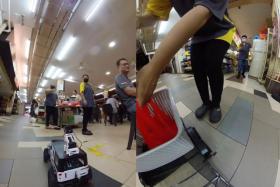Stop being afraid of technology
A double-edged sword whose potential we must learn to harness
Technology is supposed to improve our lives, but you would not have known that from the many recent reports of how it has caused us much grief.
There is the proliferation of online scams milking victims here of millions and the peddling of drugs online to hook young addicts.
Then, there were cybersecurity issues like the Ministry of Defence having to deal with a breach where the personal details of 850 of its personnel were stolen.
Disruptive technologies are also giving workers sleepless nights, with many worried about being made redundant.
But is technology truly evil, or is it only disruptive if we do not fully embrace and utilise its potential?
Just last week, a case of how everyday technology came to a person's rescue emerged from the Supreme Court.
It was heard on Thursday that a mobile app, Find My iPhone, allowed a worried man to track down his missing girlfriend - who suddenly stopped replying his messages - in 2014.
He homed in on her location - an apartment in Bukit Timah - where he found her in a stupor, lying on a mattress with another man who is now on trial for her rape.
This app was also used in 2015 by a freelance trainer to track down a thief who had stolen his iPad from his gym locker.
It turned out the culprit, a tourist from the UK, had stolen more than $12,000 worth of cash and belongings on several instances from 10 such lockers and was later jailed 26 months.
SAVING LIVES
There are also examples of everyday technology saving lives elsewhere in the world.
In the US, doctors at Nicklaus Children's Hospital in Florida saved a baby's life by combining Google cardboard - a cheap virtual reality headset - with 3D imaging.
The contraption allowed them to envision and prepare for the complicated surgery on the baby - who was born with one lung and half a heart, reported CNN.
Social media outlets, like Facebook and Twitter, have also been used by netizens to save lives.
In 2012, a 47-year-old man posted on Twitter about how he had stockpiled anti-depressants and had planned to post live updates as he committed suicide, reported the Metro.
But other Twitter users - including strangers - spotted his tweets and alerted police and paramedics, who rushed him to hospital.
Technology is a double-edged sword, Mr David Maciejak, head of cybersecurity firm Fortinet's FortiGuard Lion R&D team for Asia-Pacific, told The New Paper.
He said when Alexander Graham Bell invented the telephone 140 years ago, some church leaders called it the instrument of the devil.
But today, the smartphone has embedded itself as a staple source of communication, photography and entertainment in our lives.
"It's instinctive for humans to fear what we don't know, and what we can't control.
"Instead of shunning new technologies outright, people should adopt them at their own pace," said Mr Maciejak.
Professor Alexander Siedschlag, who chairs the Pennsylvania State University's homeland security programme in the US, made a good point that every risk can be turned into an opportunity.
He told me during this week's Milipol Asia-Pacific homeland security conference how Internet-savvy Singaporean youths were.
He said such potential could be tapped on by the Government to help detect and stop extremist ideologies from spreading online, instead of getting youths to completely avoid the Internet for fear of getting radicalised.
Technology may be a frightening frontier where criminals are flocking to today.
But it is also the platform that we can use to improve lives.
And the only way we can do so is if we stop being afraid, and learn to harness its full potential.
Get The New Paper on your phone with the free TNP app. Download from the Apple App Store or Google Play Store now



